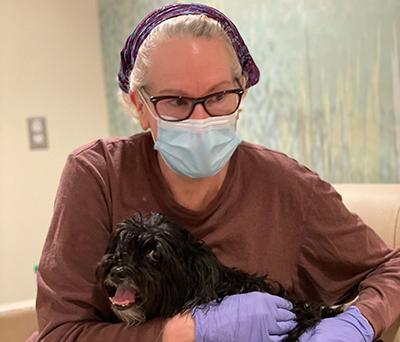-
About
- Leadership & Faculty
- News & Events
-
Academics
- Graduate
- Advanced Clinical Training
- Continuing Education
- Academic Departments
- Academic Offices
- Simulation Experiences
-
Student Life
- Offices
-
Research
-
Hospitals & Clinics
- Emergency Care
- Hospital Services
-
Community Outreach
- Volunteer
Havanese Survives Leptospirosis at Foster Hospital
Frank’s attentive owners and doctors helped put him on the road to recovery

Beth Vissers realized something was off with her 10-year-old Havanese, Frank, earlier this fall. After he vomited two nights in a row and was unusually quiet, Ms. Vissers took him to their veterinarian near Saxtons River, Vermont.
Bloodwork showed high kidney values, so the vet referred Frank to the Small Animal Veterinary Emergency & Specialty Hospital (SAVES) in Lebanon, New Hampshire. He was transferred to the Burlington Emergency Clinic for an ultrasound and more tests, which came out negative for Lyme disease, but positive for Leptospirosis, a potentially fatal bacterial disease contracted through standing water. The diagnosis came as a surprise to the Vissers, since it’s not recommended as a core vaccine by all veterinarians.
Concerned with Frank’s elevated kidney values, Ms. Vissers researched dialysis
availability in New England and came upon Foster Hospital for Small Animals at Tufts University. After calling Foster Hospital, she and her husband drove through the night to Grafton, arriving at Foster Hospital at 5 a.m. the next morning.
“Unfortunately we see Leptospirosis frequently,” said Dr. Colleen Bourque, resident at Foster Hospital. “This past year we’ve seen many cases due to the wet summer and fall. We often have cases referred to us for dialysis secondary to kidney failure from Leptospirosis.”
Dr. Bourque treated Frank with antibiotics, IV fluids, and anti-nausea medications, eventually adding in antacids, blood pressure medications, and appetite stimulants since he was reluctant to eat.
“With early and aggressive treatment, prognosis can be excellent,” said Dr. Bourque. “Many dogs can return to either normal kidney function or have some residual lingering kidney disease that we need to manage going forward. Unfortunately, there's no telling how well they'll do at the time of diagnosis, it really depends on how they respond to treatment.”
Frank spent six days at Foster Hospital before being released. Dr. Bourque contacted the Vissers daily with updates.
“Dr. Bourque was wonderful, really truthful with us and very reassuring,” said Ms. Vissers. “She always had her eye on his whole system, not just the kidneys.”
After two days at home, the Vissers brought Frank back to Foster Hospital worried he was not thriving. After three more days in the hospital, he became well enough to return home.
“We knew we had him in a place where they would do whatever they needed within reason,” said Ms. Vissers. “If he didn’t stand a good chance of recovery, we didn’t want him to go through a lot of discomfort, but he quickly began to recover.”
Frank’s symptoms continued to subside, with his kidneys currently at near normal levels. He seems to be getting back to his old self, with his appetite returning and his playfulness.
“Sometimes he’s very rambunctious, wants to play, and eats well, and other times he’s not. It’s a cycle,” Ms. Vissers said.
She was especially touched by everyone she came in contact with at Foster Hospital.
“The students that called me with reports and brought him out to us were amazing and very attentive,” she said. “Dr. Bourque was always careful in her prognosis. She didn’t try to make it more promising than it appeared to be. My overall impression of the whole care and comfort we received from Foster was great.”
Dr. Bourque will continue to monitor Frank as his kidneys recover, but his prognosis is “very good.”
What is leptospirosis?
- Leptospirosis is a disease caused by a bacterium (genus Leptospira) that can adversely affect your dog and be transmitted to humans.
- Wildlife (raccoons, skunks, foxes, and rodents [mice, rats, moles]) carry these bacteria that are shed in their urine.
- Dogs can become infected by coming in contact with the urine from wildlife or contaminated water or soil.
- The disease can rapidly become life-threatening to dogs, targeting kidneys, liver, blood vessels, but also lungs and heart.
Concern
2021 has been a particularly warm and wet year, an ideal environment for leptospirosis bacteria to thrive. Also, this has been a great acorn year, so all the wildlife are stocking up for winter and moving through backyards. This is the reason we see an increase in cases in the fall and early winter.
How can you protect your dog?
- All dogs are considered at risk in our area.
- The leptospirosis vaccination can prevent disease and will protect your dog from severe illness.
- Make sure your dog has a current leptospirosis vaccine (two initial doses 2 weeks apart, with a booster once a year thereafter).
Please contact your primary care veterinarian for further recommendations and assistance.
Department:
Foster Hospital for Small Animals